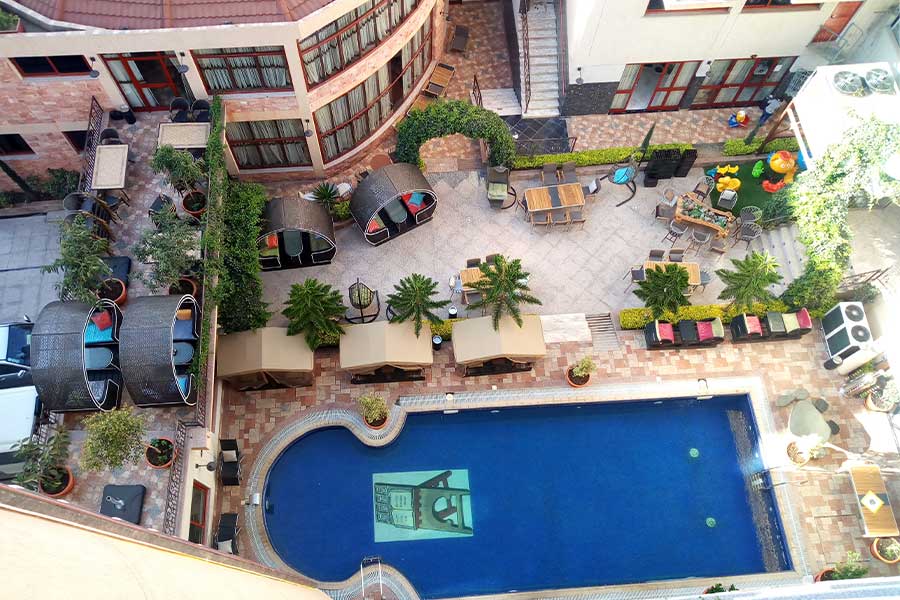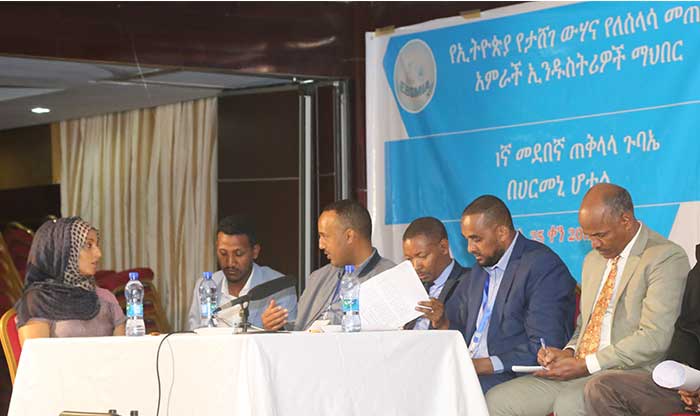
Fortune News | Mar 07,2020
Jan 25 , 2020
By Sileshi Yilma Reta
To say that Ethiopia is going through trying times is an understatement. We are in uncharted territory. We can speculate, but we are at a loss to explain just what the future holds.
The political transition that started in April 2018, which came at a significant cost, has faced grave challenges. This was not unexpected. But two years later and after the unraveling of the sociopolitical order, a new normal has emerged. Unless we address it, it is a terrible state of affairs for a country that has long assumed it was on a path of prosperity.
One of these new normals that is hard to overlook is the destruction of property, especially targeting main infrastructure. The most profitable public enterprise, Ethio telecom, is one of the victims. It incurred an estimated 100 million Br in losses due to damage caused by vandalism in the first half of the current fiscal year. This was mainly related to copper cables and optical fiber lines.
There has also been 38 million Br worth of losses incurred due to damage to electric transmitting lines and transformers. Neither has the Ethiopian Railway Corporation been lucky. It had on various occasions issued statements regarding repeated lootings of the infrastructure that stretches across the country, posing a hurdle to its day-to-day operations.
These major institutions, which have repeatedly become targets of vandalism, are among the top contributors of developmental endeavours of the nation through the profits that directly go into government coffers. Such kinds of attacks on these institutions could ultimately weaken, not only their contribution to their already poor service provision, but also their contribution to government revenue.
Illegal smuggling of firearms and foreign currencies across the country is the other new normal of recent years. In the past few years, photos of illegal firearms and foreign currencies captured by the authorities after alleged routine searches have become a regular feature of media coverage.
What is more surprising is that these items were not only seized in border areas, where we would expect them to be rampant. There have been cases where the authorities found illegal arms being smuggled into Addis Abeba.
Where these illegal weapons being smuggled into the country were going or for what purpose they were to be used is not clear.
Perhaps less worrying but deserving of attention no less are bank robberies. Despite underreporting by the mainstream media, it has also become the new normal in Ethiopia in recent times. There have been alleged robberies of various banks, especially of branches located outside of city centres. These are Hollywood-style robberies where the robbers use vehicles and study closing and opening hours of the bank branches.
Where does the money that is robbed from the banks end up? Do we know if these are petty thieves looking for a big score and not terrorists with political agendas? Are we ushering in an era of organised crime?
Another recent norm is kidnapping. For anyone my age, this phenomenon is completely unprecedented. The country may suffer from various problems, but abductions are mostly unheard of. Recently, the Amhara and Oromia regional states have been scenes for such incidents.
The kidnappings involving students of Dembi Dolo University have been at the centre of news in the past couple of weeks. The conflicting accounts of federal and regional government officials have added fuel to the already escalating public outcry.
Another hostage incident in Amhara Regional State last month was also the talk of social media. Some of the children that were kidnapped were reportedly killed by their captors when their parents were unable to pay the requested ransom.
Another new normal is the situation in public higher learning institutions. No doubt, universities in Ethiopia are not new to unrest. Starting in the late 1960s, universities have hosted a wide range of demonstrations. In previous times, students had united to voice their common concerns and had contributed their part in the political changes that Ethiopia desperately needed.
However, the questions raised by students have gradually changed as a result of political transitions. The spirit of solidarity once enjoyed by students, even as late as the anti-government protests that brought about this transition, has vanished. Students have turned on one another.
In the past few years, higher educational institutes in Ethiopia have experienced trying times. Several students lost their lives and many were injured. Properties were also damaged.
Despite having heard about all of this, many of us were still surprised to learn that 35,000 students had fled public universities due to the conflicts. This happened even after federal police were made part of campus security.
The government is taking a number of measures. Students who were found to have been involved in the instability were either suspended, received warnings or got expelled. High ranking officials of universities were also removed from their posts.
Under all of this upheaval of law and order, the increase in crime should not be surprising. It is perhaps the least worrying of these trends, but Addis Abeba, the political capital of the continent, has recently become home to an explosion in car theft. In the first six months of this fiscal year, 155 cars were stolen, according to the Addis Abeba Police Commission. Car owners in Addis Ababa no longer feel safe to leave their vehicles even in secured parking areas.
These are only some of the most pertinent new trends detrimental to peace and security observed in Ethiopia in the past few years. Whatever the new trends, however, we need to focus on the remedies.
The government is the major stakeholder in addressing these challenges. But we have responsibilities on our shoulders too. In fact, a major part of our predicament today is that we expect the government to do all of the heavy lifting. But we too can contribute, mainly by informing ourselves and playing a role in community activities.
PUBLISHED ON
Jan 25,2020 [ VOL
20 , NO
1030]


Fortune News | Mar 07,2020

Radar | Feb 25,2023

Commentaries | Jun 07,2025

Fortune News | Sep 18,2022

Fortune News | Apr 06,2019

Radar | Jun 07,2025

Fortune News | Mar 28,2020

Radar | Aug 03,2019

Radar | Feb 12,2022

Fortune News | Jul 11,2021

Photo Gallery | 177507 Views | May 06,2019

Photo Gallery | 167715 Views | Apr 26,2019

Photo Gallery | 158380 Views | Oct 06,2021

My Opinion | 136987 Views | Aug 14,2021
Commentaries | Oct 25,2025

Dec 22 , 2024 . By TIZITA SHEWAFERAW
Charged with transforming colossal state-owned enterprises into modern and competitiv...

Aug 18 , 2024 . By AKSAH ITALO
Although predictable Yonas Zerihun's job in the ride-hailing service is not immune to...

Jul 28 , 2024 . By TIZITA SHEWAFERAW
Unhabitual, perhaps too many, Samuel Gebreyohannes, 38, used to occasionally enjoy a couple of beers at breakfast. However, he recently swit...

Jul 13 , 2024 . By AKSAH ITALO
Investors who rely on tractors, trucks, and field vehicles for commuting, transporting commodities, and f...

Oct 25 , 2025
The regulatory machinery is on overdrive. In only two years, no fewer than 35 new pro...

Oct 18 , 2025
The political establishment, notably the ruling party and its top brass, has become p...

Oct 11 , 2025
Ladislas Farago, a roving Associated Press (AP) correspondent, arrived in Ethiopia in...

Oct 4 , 2025
Eyob Tekalegn (PhD) had been in the Governor's chair for only weeks when, on Septembe...

Oct 25 , 2025 . By YITBAREK GETACHEW
Officials of the Addis Abeba's Education Bureau have embarked on an ambitious experim...

Oct 26 , 2025 . By YITBAREK GETACHEW
The federal government is making a landmark shift in its investment incentive regime...

Oct 26 , 2025 . By NAHOM AYELE
The National Bank of Ethiopia (NBE) is preparing to issue a directive that will funda...

Oct 26 , 2025 . By SURAFEL MULUGETA
A community of booksellers shadowing the Ethiopian National Theatre has been jolted b...